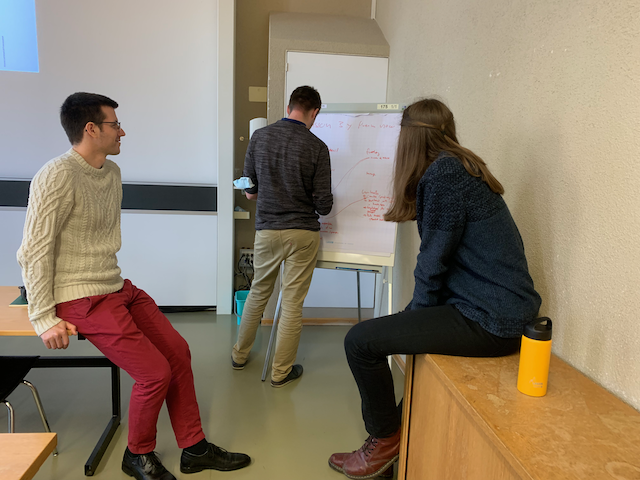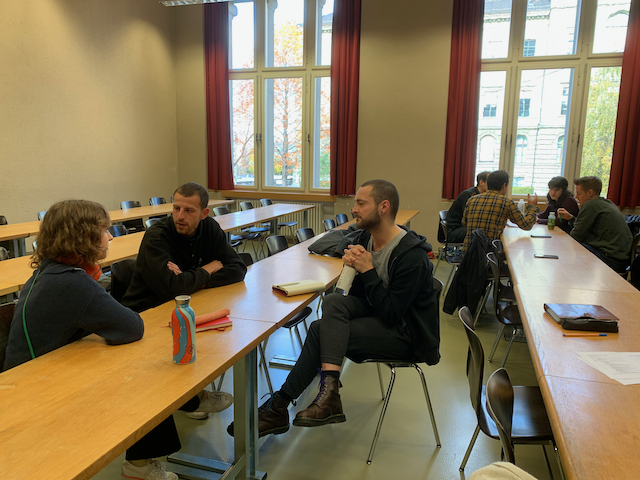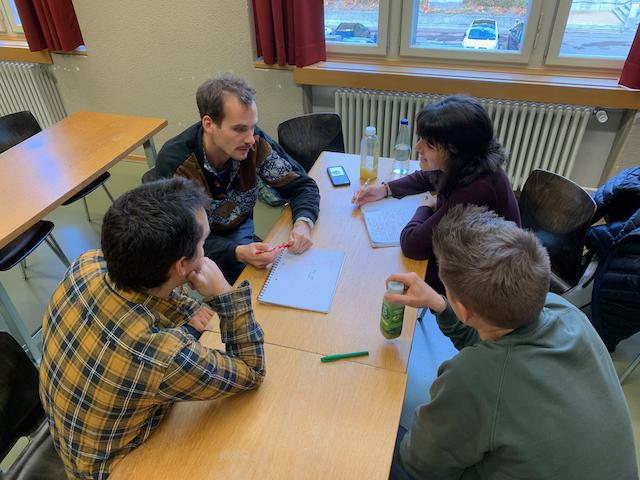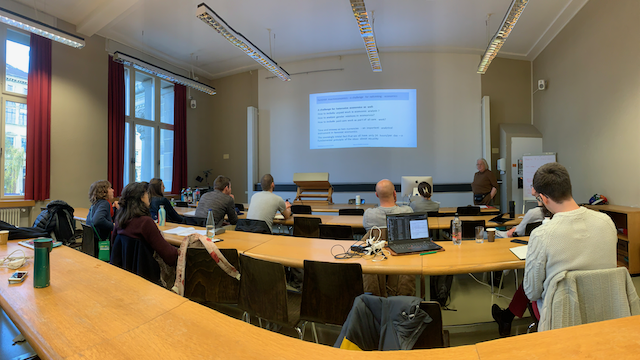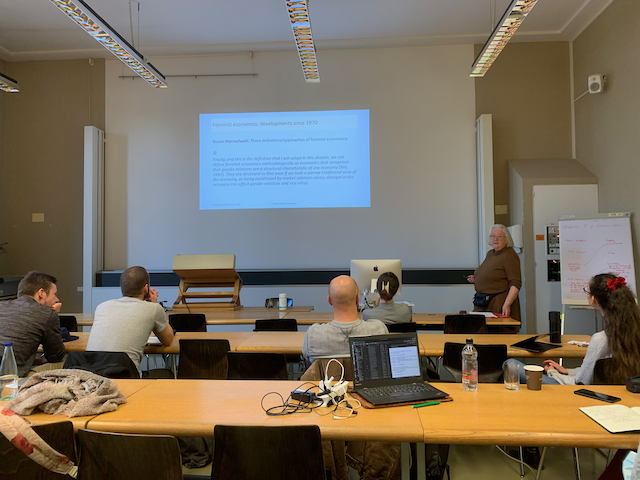Swiss National Gathering (Nov. 2021)
Summary of the Workshop’s Approach and Outcomes, and of the Learnings from the Presentations on Feminism in Economics.
On November 6th 2021, the Swiss network of Rethinking Economics met for its yearly National Gathering. The morning was focused on an internal workshop to brainstorm where we would like to be as a movement three years from now. The afternoon was centered around the topic of Feminism in Economics, with two economists invited to present their work on gender, feminism, and economics: Ana Costa-Ramón and Mascha Madörin. The insights from these two presentations are described further below.
First, this blog will describe how the workshop was organized, what questions and techniques we used, and what the main outcomes were. We hope that this will inspire other Rethinking groups to adapt our techniques to their own context and to improve on this model.
Workshop
Before starting with the workshop, we did a quick round of introductory “speed dating.” The idea was that everyone would get to speak with every other person at least once, for a very short moment. The questions asked were not necessarily related to the topics of RE and included much more general topics. “What is your earliest memory?” or “What is a memory you cherish about your mother/father?” were as relevant as “What sparked your interest in joining an RE group?”
RE Switzerland in 3 Years
After this intro round, we hunkered down in groups from mixed local RE groups to come up with ideas for where we as the Swiss RE movement would like to be in three years. For this, we focused on two rounds of brainstorming and a final round of sharing insights and ideas.
(1) The Swiss RE Network in 3 Years
The first round focused on the following question: What does the whole Swiss RE network look like in three years
To support the brainstorming, we included the following topics as potential areas to consider:
- What have we achieved & what are our academic objectives?
- What about the local groups?
- What connections to other organizations & people do we have?
- Alumni?
- Funding situation?
- What is our public image, how are we present in the public?
- What does our umbrella organization look like? (RE-S)
We closed the first round by each group presenting their ideas and questions being asked only to make sure that the ideas were understood. There was no intent to discuss any of them in depth, since the goal was only to open up our imagination.
(2) Local Swiss RE Groups in 3 Years
The second round of brainstorming took place in the local groups with the following question: What would your local group look like in three years? How could the national network support the local groups?
These supportive questions were added for brainstorming:
- What will your local group’s role be in 2025?
- What does it look like?
- What do you need to get to that role in 2025?
- What role should the national network look like in 2025 to support you in achieving this?
Again, we closed the round with every group presenting their ideas, with a focus on understanding (not on discussion). The reason was again that we wanted to open up the imagination. Furthermore not all the members from each group were present, and chances are anyway that the composition of the local groups will change over time. So these were thought of as aspirational goals, not as binding.
(3) Wrap-Up and Outcomes
As a wrap-up of the morning workshop, we invited every participant to share one thing which they wanted to take with them — something they found inspiring or something they would like to do.
And here is how, according to this workshop, the Swiss RE network should look like in three years (in no order of importance). We want…:
- to better integrate alumnae/-i, e.g. in a “rethinking hub,” a “pluralist hub,” or through “Friends of Rethinking Economics Switzerland” (FoRES);
- to secure funding to pay a secretariat at the national level amounting to 20% (1 day of work per week) to support the network;
- generally strengthen the national network, so that it in turn can better support the local chapters, and to make sure that each Swiss university has its RE group;
- to formulate and implement a better recruitment strategy;
- to strengthen our online & general media presence;
- to organize at least one (credited) course on pluralist economics at each Swiss university;
- to increase the share of women who are active in the network;
- to organize a yearly summer school and a yearly national conference;
- to build the connections necessary to successfully push for a minor in pluralist economics offered at (minimally) one Swiss university;
- to actively expand and develop our network of pluralism-friendly professors and institutions in Switzerland.
Presentations on Feminism in Economics
In the afternoon of the same day, Ana Costa-Ramón and Mascha Madörin presented work on gender and feminism in economics. After their presentations, informal conversations continued for another hour. Here are short summaries of their presentations.
Ana Costa-Ramón
Costa-Ramón, one of the youngest and newest additions to the Economics department at the University of Zurich, presented work on the income effects of a child’s severe disease or death on its parents. Her research shows that the income effects are especially important for mothers, with lower income over several years following the child’s sickness or death. For death, the measured effects are stronger. For fathers, though not statistically significant, the income shock even seems to be slightly positive (earning more).
Her research not only shows that there seem to be gendered differences at play with effects on income, but also that the effects continue for several years. She shows evidence of this for Finland and Norway, two countries usually seen as leaders in gender equality and considered to have some of the most comprehensive gender and family policies in the OECD. Even in these countries, health shocks during middle childhood to teenage years still have a disproportionate effect on women’s labor market outcomes compared to men. These findings are policy-relevant and suggest that the disproportionate costs of children for women’s careers do not end with childbirth.
Mascha Madörin
Madörin, one of the early Swiss feminist economists, presented work on how to measure the “economy” in a way which includes so-called care work. She developed her approach from the statement that not all output is equally easily traded, and that “care work” is basically not tradeable. Based on this, she proposed a differentiation of the “economy” into four sectors: (1) agriculture; (2) industry; (3) services like banking, whole trade, research; and (3) direct social provisioning services. This last one, she argues, has a different economic logic as it consists of direct personal interaction and household-related services, including retail trade and hospitality services or the work of government, education, health care, child-rearing, taking care of family and friends, and various forms of volunteering. For these forms of action, she sees a different logic of work, exchange, and price relations when compared to sectors (1)-(3). These three sectors are characterized by very extensive substitutability, whereas the sector of direct social provisioning is characterized by the importance of locality and the specific person providing the service. On a more abstract level, she speaks of two overlapping and interconnected socio-economic systems: “the social system of social provisioning” and “the social system of accumulation.”
She then proposed to analyze the different parts by using two “currencies,” namely money and time. With this, she compares time and income, and shows the gendered relations at play in the distribution of work and income. She states that the more tradeable areas create more income per hour spent, and that men are working more in this more monetized and more tradeable economy. And within these three sectors, she shows that men tend to be higher up in the distribution of incomes per hour spent. Her work thus suggests that income-precarity is gendered, that time-poverty is an important lens through which to analyze economic processes, and that time, in addition to money, can serve as a currency to shed light on the distribution of work.
Final Thoughts
Throughout the day, we had lively discussions, both during the workshop and in the discussions following the presentations in the afternoon, and these continued during the apéro.
Members of local groups were happy to meet and get a feel for the larger pluralist movement of which they are part. It was even more valuable to members who were not usually representing their own group at the national level, and who generally did not see the other people active in other parts of the country. They were also able to obtain feedback about their own projects and discuss ideas for the future development of their groups. Last but not least, this was also an opportunity for young members to get a first taste for the breadth of feminist economics, which was very inspiring for several new members of local groups.
Image Gallery
